| |
"Of course it's perplexing that Forsyth should make four wonderful films in five years and hardly anything in the next 30, but the creative peak of many careers is often extremely brief. 'I feel like a bit of a fossil,' he says, but who cares if he hasn't had a hit for a quarter of a century? He made four great movies, and that's four more than most filmmakers ever make." |
| |
William Cook interviewing Bill Forsyth for The Spectator magazine* |
Fingerbone, Idaho is not a place, however fictional, to celebrate life's edgier characters or to turn suppositions and assumptions on their heads. It's a place to utterly conform. It's a town where compliance to set norms is the cloth you cut accurately or risk social opprobrium. You can't even play hide and seek with your niece on a cold night without a lawman suggesting he take away the child for her own wellbeing. Even the town's morbid claim to fame took place at night with no evidence ("save a suitcase, a seat cushion and a lettuce"). It was a huge and significant tragedy, one that besmirched Fingerbone to the marrow. A train derailed off a wooden bridge and slipped into the icy waters of the lake "...like a weasel sliding off a rock," with the ice forming over the hole made, neatly tidying up the carnage and inevident horror. Even the town's disasters were accomplished demurely but just imagine the terror of being a passenger on that train... Take a step off the commonplace carpet and you're on foreign floorboards, destined for ostracism, behavioural control and even the risk of some jail time. Housekeeping is Bill Forsyth's charming if esoteric adaptation of the novel by Marilynne Robinson. Set in the 50s in the Midwest of the US, sisters Ruthie and Lucille are being brought up by their grandmother's sisters-in-law after their mother commits suicide. It shocked me that I remembered starkly the shot, pre-suicide, of the mother offering her handbag out of the car window to the boys helping her get unstuck. It's the timing of the gesture as well as the configuration of her fingers that I remember so vividly but God knows why. Some images, like her vehicle, simply get stuck.
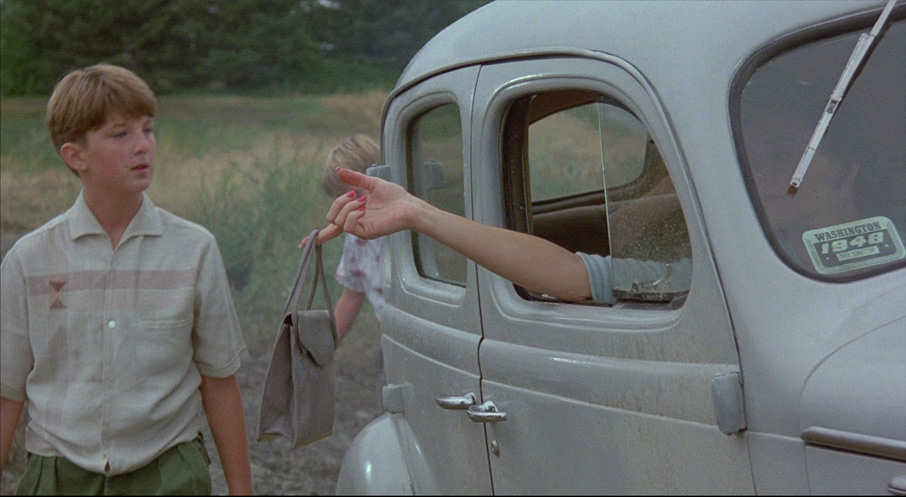
An aunt arrives in the form of young Sylvie who takes over the maternal duties from the relieved older women. We know something's up as soon as Sylvie reveals two strips of newspaper she's been wearing as a scarf. Sylvie is a free spirit whose behaviour at first unnerves and baffles the girls. As the sister to the suicidal mother, you sense that whatever pushed her sibling to such despair may have pulled Sylvie in a very different direction. Ruthie is intrigued by her aunt's oddness while Lucile covets what most teenagers wish for, acceptance and to some degree born from this, rigid conformity. I had a French teacher who taught philosophy on the side and he acknowledged that rebellion is inherent in teenage life and that we all - not so secretly - wanted to be outsiders. "Is that why all of you wear the same brand of denim?" he asked challengingly. He turned fashion into a fascinating foil for our young minds. We were all mundanely complying with what society expected from us. Cue the cry of "We are all individuals!" from Life of Brian. "Rebels," as the great Albert Camus once said "...say no." None of us said "No!" to a pair of Levi's. God, I'm wearing a pair right now. Sylvie's behaviour mortifies Lucile who sees her as a dark stain on her otherwise spotless orthodoxy. But Sylvie's outlook and idiosyncratic character are strangely attractive to Ruthie. Like a fledging romance, Ruthie starts to see the world from a different perspective and only by doing that can she see the world with new eyes. I guess that idea of transformation holds in all walks of life and in a few marathons too.
Both source novel and film are told from Ruthie's point of view (Forsyth's first draft started with fourteen pages of voiceover) and in narrative terms, nine months in the life of this small family unit is really all you get. One sister distances herself while the other is drawn in towards her aunt and her singular philosophy and outlook. After I watched the film with my partner, she said "Let me know if you find out what the film was actually about..." and that's a valid statement. Truth be told (because everything else I've written are bald faced lies... such an odd phrase), this is not a normal movie by any painful stretch of the imagination. It is a character study, a close, non-judgemental look at one of life's authentic, unthreatening outsiders. The narrative is the simple progression of time in the life of a small family. Incidents play out and invite us to have opinions on Sylvie's actions but the filmmaker's glare never feels judgemental or critical. It is very difficult to present a 'self' offering nothing conventional for an audience to hold on to in the way of events or conventional film action.
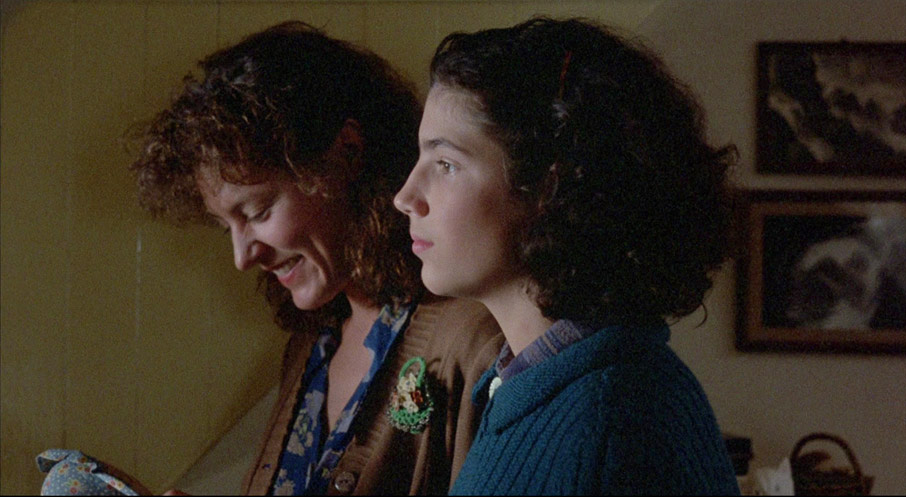
We get to know Sylvie by her inappropriate but childlike acceptance of almost everything (both fire and water included). We also learn about her through her two nieces, one of whom, Lucile, has the heavy yoke of fitting in biting through her shoulders and the other, Ruthie, is captivated by how different a human being can be and a related one at that. It is a very hard thing to write enlightenment in a filmed character because it's an internal process. It's just as hard to depict a character that exhibits an absolute acceptance of her own 'self'. Christine Lahti, in a career defining role as Sylvie, not only manages to give this odd but becoming woman some life, she fills Sylvie with that off centre, italicised emotional heft that is at once both charming and quietly unsettling. The audience is watching through Lucile's eyes at the start and we gradually change our perspective in line with Ruthie's own. Sylvie is a wild animal without the instinct or need for violence, a human being who sees the world unlike anyone else and as viewers, we get the merest impression of her oddness as one's real self is as undetectable to us as it presumably is to her. Most of the time, her curiosity and pronouncements are born from a place of security. Nothing seems to phase her. In fact, events that would make most of us wail against fate and cluck with impotency, Sylvie merely and cheerfully accepts. Under six inches of water after a flood, she inhabits the kitchen as if nothing is out of the ordinary, finding a new place to discard cold coffee. Only later in the film when things become darker for Sylvie, do we see real fear flicker across her face.
The events of the film take place over three seasons, lovingly photographed by Michael Coulter. There is a classic film beauty to some of the more haunting shots on the lake in magic hour and a general pleasingly rustic hue and tone to the interiors. Michael Ellis's editorial style takes in quite a few blatant jump cuts no doubt suggested by Forsyth's script. Scenes are ended abruptly in terms of visual continuity but as this never really calls attention to itself, it's perfectly acceptable and on first viewing quite invisible. The score by Michael Gibbs (that's the third Michael) is lyrical and haunting and its extended notes stay with you after the credits. This is a film with a spell to cast and I have to say, the more times you see it and pick up on the subtleties, the more resonant the spell becomes. These subtleties are mostly in plain sight. There's a moment in the film when a shop proprietor sets up a cardboard cut out, full size, of a man and woman smiling next to a fridge. The caption reads "If you really want to please her, give your wife a fridge and freezer." Now Sylvie may be amused by the god-awful rhyme but the laugh she gives to this ridiculous piece of 50s marketing suggests a lot more. It seems to be an acknowledgment of the absurdity of enclosing the human animal in cages and boxes of enforced predictability. I suppose marketing does that as a matter of course. I may be reading too much into this moment but it did resonate a lot more deeply on the third viewing. When Helen (the suicidal mother) reaches her small town destination to drop off the children, in an artful wide shot calling attention only to the moving car, she gently brings the vehicle to a stop. It's only after this you notice the green for go light suspended over her. You're ahead of me here... She only sets off again when the light turns red.
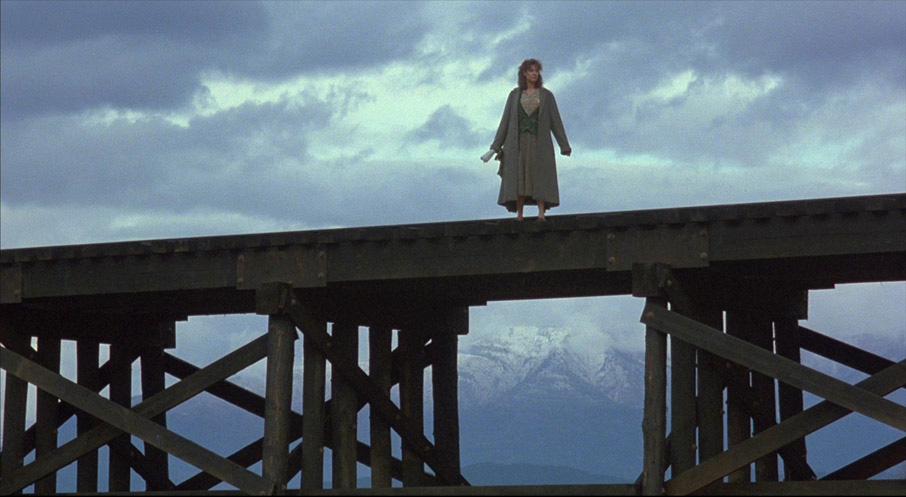
But it is the acting that truly stands out. These are difficult characters to render successfully. Even Forsyth admits that the film is a promo for the book so the film was never going to feel like an 'ordinary' movie with an inciting incident, three acts and our hero/heroine at their lowest ebb at the end of act two only to triumph at the close of act three. So the pressure falls on the believability and authenticity of the characters and the actors' abilities to let us inside their heads. Christine Lahti as Sylvie wears a long coat in such a beguiling way. With some effort, you can imagine first choice Diane Keaton in the role but Lahti has made it her own. She seems to make no effort at all which makes the performance all the more beguiling. Sara Walker as Ruthie is the wide-eyed, open to wonder child, gangling and awkward. She's unsettled but intrigued by Sylvie at first but a bond develops taking her too far from her sister to ever return. Lucille played by Andrea Burchill has the slightly less sympathetic role of the conformist but as I mentioned, there are no judgements meted out to anyone in the film. The only 'bad guy' is the rigidly suspicious lawman who is anxious to punish Sylvie for her lackadaisical approach to childcare. One final acting nod; the performances of Tonya Tanner as Young Ruthie and Leah Penny as Young Lucille are of very small, befuddled children but they bear an uncanny resemblance to the older actors that would continue their parts. Forsyth admitted that he cast the characters by looking for those specific people who resembled their characters most. The older girls were not professional actors but that never shows. Forsyth is too good a director to compromise as far as the acting is concerned. There's a scene between the sisters in which Lucile rebukes Ruthie for being out all night on a compromised rowing boat with a woman who should have been scared by events as 'any normal' person would've been. Ruthie admits that "I can't explain it to you, Lucile," and this is very much how I feel reviewing the film. I may not know the answer to my partner's question, what was the film actually about, but I feel films like this need support more than ever, works that shows us that cinema has the ability to transcend the narrow confines of the three act structure and still be compelling. Housekeeping is a real oddity, just like its leading lady, but don't let that put you off the small but potent pleasures that the film delivers.
The 1.85:1 aspect ratio is correctly rendered here with the narrow letterboxing on a 16x9 TV. Michael Coulter's cinematography is quietly impressive and the colours are pastel muted throughout which adds to the overall 50s ambience. The detail in this 1080p transfer reveals the edges of some of the special effects if you know what to look for (and why should you?) Let's put it this way, every time we see the entire wooden railroad, there's trickery of one sort or another to be found. In the chemical days of the 1980s, effects now pathetically simple to achieve, took some care and artistry to refine. The contrast is pleasing with no detail lost in the darker areas of frame. The grain is evident but only if you're looking for it.
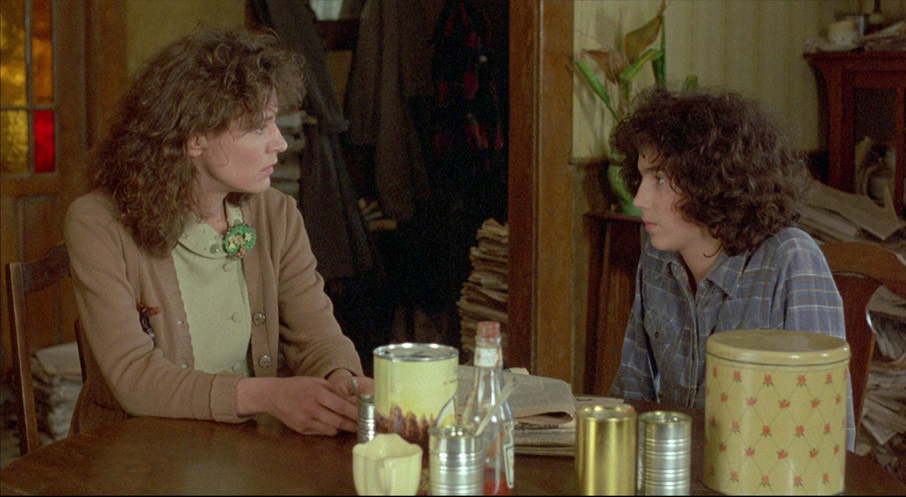
There are no clarity issues with the stereo soundtrack and the mix is always unfussy and doing its job quietly in the background.
There are new and improved English subtitles for the deaf and hard-of-hearing.
New interview with director Bill Forsyth (41' 49")
This is essentially a mid-shot of Forsyth letting us know all he can remember about the pre-production and production of Housekeeping. There is a great deal of repetition as a lot of the stories he tells are told on the BFI archive interview but over the length, he keeps us interested and there's enough new information to keep us with him. I love that he credits Christine Lahti as a co-director. This is a film director whose ego is in the service of good work, and is the antithesis of Hollywood as anyone gets.
New interview with author Marilynne Robinson (13' 36")
Robinson, with her long, grey hair and introspective demeanor has only positive things to say about the production of the film of her novel and how gracious the filmmakers were to incorporate her into the process. There are some lovely stories in this short interview; my favourite was her small remark that her grandmother would never have had a picture of the then president on the wall and seeing the set dresser whip it off almost immediately. Reverence or respect for the writer seems all too much an historic conceit these days.
New interview with cinematographer Michael Coulter (12' 54")
Coulter takes us through his career and association with Bill Forsyth. I had to keep reminding myself that this man was Richard Curtis' go-to cinematographer for his directorial debut, Love Actually. Coulter lit Four Weddings and Notting Hill so was well known to Curtis. A genial man in his sixties, he landed the Housekeeping assignment at the age of 35, which in the 80s was akin to childhood for cinematographers. Again, with the lovely lilt of the Scottish accent, this unassuming and soft-spoken man is so self-deprecating. Talented folk, secure in their abilities usually don't sing praises to themselves. It struck me that I would love to be in these people's company. Forsyth's casual intensity (as much as an oxymoron that might sound) is a bugle call to other people with talent who express themselves gently, with little fanfare. I suspect their meetings would be so lively and their creative ideas given and taken freely.
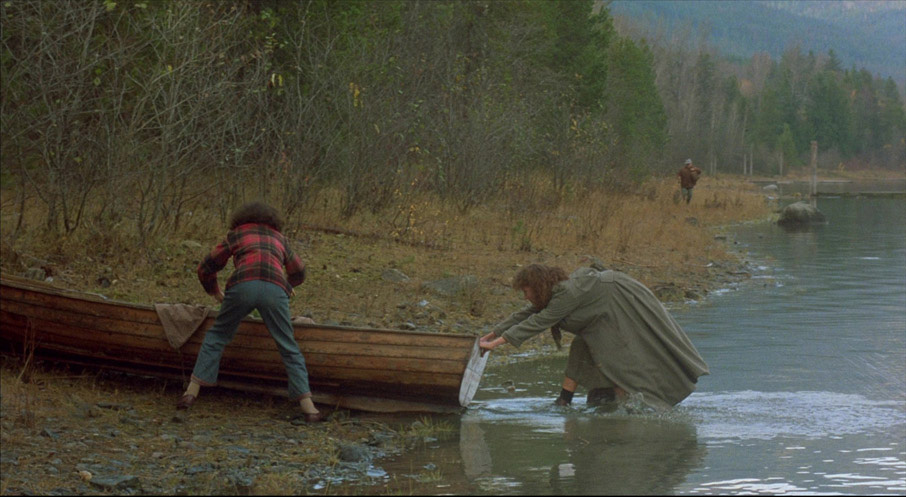
New interview with editor Michael Ellis (10' 53")
I wonder if the editor has the same kind of character... There you go. Ellis got involved with Forsyth on Comfort and Joy and went on to be his editor of choice for his next, the infamous Being Human. It's always good to refer to the IMDb just to see what else he was involved with... He started his career with assisting on If.... and O Lucky Man, and graduated to editor having two beloved projects of this site on his CV; Cross of Iron and Superman. This short piece is another lovely wander down Housekeeping's memory lane.
BFI Interview with Bill Forsyth (36' 00")
This is an interview held at the National Film Theatre on the South Bank in London on 28th May 1994 hosted by the BFI's Nick James (current editor of Sight & Sound). It's held after a screening of Housekeeping and from audience questions (levels driven up delivering quite inaudible questions and a glut of background hiss) Forsyth tells the whole story of the film's inception and production. Almost everything said here is retold in the 2017 interview. But then why would these stories be different? He's always an interesting, soft-spoken and thoughtful interview subject and a few things stand out. Firstly, he is incapable of viewing his own movies once made. He insists the interest is in the making not the completed film, something I find fascinating. In 1994, Forsyth is fresh off a tumultuous post production after he shot Being Human with Robin Williams, a movie on which the studio imposed its will effectively mothballing Forsyth's film career except for the one blip returning to the world of Gregory in Gregory's Two Girls. In fact he says that 'they' are trying to get him to do a sequel to Gregory's Girl and the audience laugh at such an absurd suggestion... But then, at 36 minutes, it feels abruptly terminated. You'd think we could have an hour with the man at least.
Original theatrical trailer (2' 09")
The voice over takes care of some of the film's inherent marketing problems (this is a tough sell, no question) but it's a sweet and thoughtful trailer, an honest indication of what you might expect from a cinema playing this highly idiosyncratic little movie.
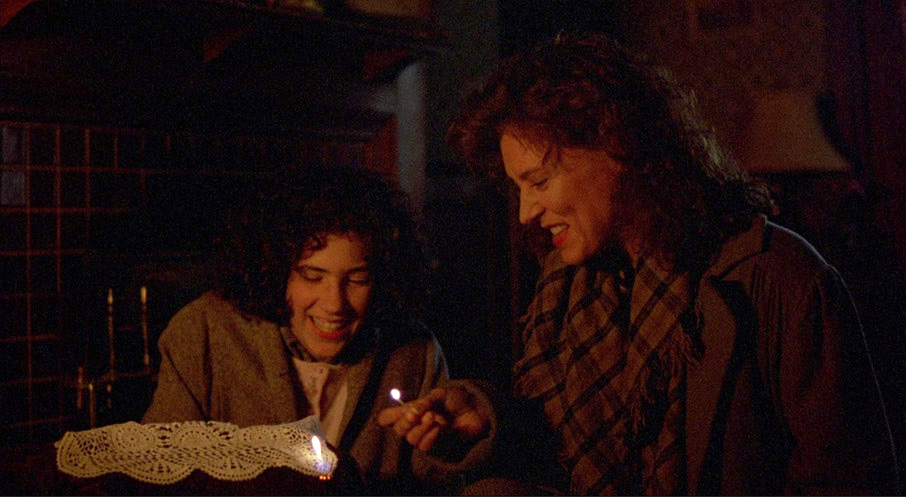
Image gallery
Production stills but this time from personal collections, which is a nice touch. From editor Michael Ellis, there are twenty-one stills with a triptych, in both colour and black and white. They give a very good insight into how the bridge was shot (and the subsequent effects work that was needed to complete the illusion. Producer Michael Coulter's contribution features script and planning documents as well as some behind the scenes stills amounting to eight in total. From John Willet, the art director, we get fifteen stills, some showing the thought behind the bridge concept (in the days before Photoshop) and some stills of the crew.
Limited edition exclusive booklet
Sacrilege perhaps but the one thing about Housekeeping that has always bugged me is its principal marketing image. It's a painting/illustration of Sylvie sitting, wryly smiling holding a cup of tea in a flooded house. There's something not quite right about the rendition of her face and it bugs me every time I see it. There are so many images from the film that would have been more alluring, I'm sure. Anyway, it's the whole front cover of the booklet. Inside is a 2017 essay on the film by Senior Lecturer David Archibald that draws thematic comparisons from Forsyth's earlier work. On page seven there's a typo ('litearture') and because we're late with this review, it may not have been spotted although I do have a PDF preview 'sample' copy of the booklet so maybe it was corrected in time. Don't let that trip you up. The essay is enlightening and a terrific adjunct to the movie with little repetition of things revealed in the extras. Sight & Sound's John Pym's conversation with Forsyth from 1987 is the second article – Housekeeping Production Report. These are always interesting being written at the time of production when everything is still fresh. The third piece is by Forsyth himself, committing to print all aspects we've already covered by two extras on the disc. It's actually a compendium of remarks taken from six interview sources. Extracts from two prominent reviews and the full BFI one round off the package; Roger Ebert's from the Chicago Sun-Times, Vincent Canby's New York Times' piece and Tom Milne's from The BFI's Monthly Film Bulletin. Each of them is a gentle rave.
I have had the pleasure over the last few weeks to thumb through back issues of the rather 'anti-Empire' film magazine, Neon. Its bullish approach to what it loves is so refreshing and Graham (co-creator of Father Ted) Linehan's end-pieces are always fun to read. But there was an article that struck me. It listed what is often said about Hollywood and movies and then underneath the cliché is the real world translation. So for example... "It's more of a character piece than a narrative," is translated as "It's boring." I eyebrow raised at that because there is a kernel of truth in it. Housekeeping is more of a character piece than a narrative... But while I can understand the critiques of "But nothing happens!", after several viewings I have to take issue with the negativity of that point of view while understanding it and remind everyone that not all films have to comply with populist criteria. This is a thoughtful and artistic movie that features first class performances and as a portrait of a true outsider, there are few films like it. It's not Local Hero (not many films are) but woven into its distinct craft is a tender and touching defence of humanity on the fringes. For that, at the very least, it should be championed.
Bill, we miss you.
|